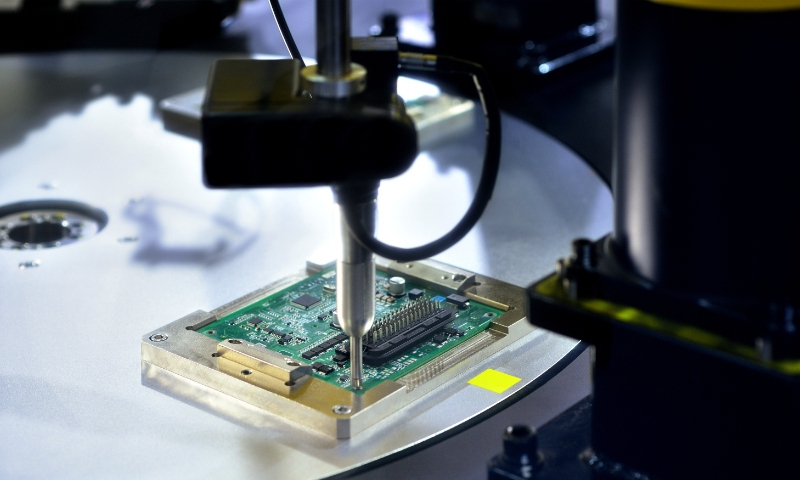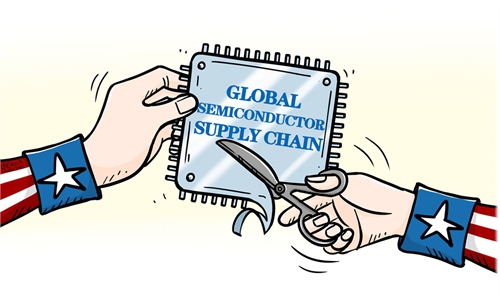US report for tougher approach on tech to China ‘old speech,’ has ‘limited’ effect on China

Production of semiconductor chip File photo: VCG
As the US reiterated the tougher approach on technologies to China on Thursday (US time), Chinese analysts said on Friday that the US action is just repeating the same old story, and it will accelerate the corresponding technological breakthroughs of Chinese enterprises, instead of blocking China's development.
The US House of Representatives released a report on Thursday, saying that the US must take immediate action to stop "the hemorrhaging of sensitive US technology to China" by tightening up enforcement of existing rules and adding new ones.
The Biden administration has made numerous efforts to stop the flow of sophisticated US technology to China that can be used to strengthen its military, but the House Foreign Affairs Committee wants a stricter approach taken amid signs technology continues to flow to Beijing, read the report.
"In recent years, some US politicians have always had a fantasy that all of China's high technology flows from the US. However, the top production process of the chip sector is not from the US. Its repeated restrictions on product exports will accelerate China's corresponding technological breakthroughs and make American companies lose market share in China, which in turn affects the competitiveness of its international market," Xiang Ligang, the director-general of the Beijing-based Information Consumption Alliance, who closely follows the chip industry, told the Global Times on Friday.
Taking Chinese tech giant Huawei as an example, Xiang noted that the Chinese company used to be the main customer of Qualcomm and Intel. With the US restrictions, Huawei has now made breakthrough, and these two US companies have lost their income from the Chinese customer.
According to a report by The Wall Street Journal on Wednesday, Nvidia's CEO Jensen Huang said that he still hopes to supply high-end processors to China, and is to continue to work with the US government to come up with a new set of products to comply with the new regulations.
Huang also said that Nvidia's dominance of the AI chip market is being seriously challenged by Huawei, Intel and a growing number of semiconductor start-ups, according to media reports.
Nvidia is working on a new lineup of AI chips customized for China, The Wall Street Journal reported in November.
Days before Huang's comments, US Commerce Secretary Gina Raimondo fired a warning shot to American chip companies about such behavior, adding that regulators would seek to clamp down on companies' moves to work around government export controls.
In response to the US export restrictions on semiconductors and cutting-edge technology, Chinese Ministry of Commerce spokesperson He Yadong told a press conference on Thursday that these measures cannot stop China's development and growth, and will only allow US companies to lose the market in China to the detriment of their own interests. China will pay close attention to the movement and impact of the US related measures, and resolutely safeguard own rights and interests.
Industry observers noted that the US repeated restrictions on tech exports to China will also hurt the interest of its allies. Some South Korean media outlets noted that South Korea's partnership with the Netherlands has become important as the US further tightens export restrictions on AI-related chips and semiconductor manufacturing equipment to China.
Like South Korea, the Netherlands suffers whenever the US escalates semiconductor-related restrictions on China, and there will be a heated debate in the country, the reports said.
"The huge demand for chips in the Chinese market cannot be ignored, and the US plan to push its allies to suppress China in the field of chips is not realistic," Xiang noted.


